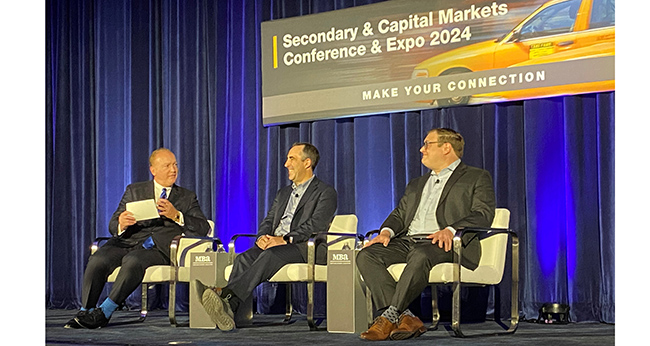
Experts Revisit GSE Reform #MBASecondary

(left to right: Mark Jones, Jaret Seiberg, Isaac Boltansky)
NEW YORK–With election season well underway, some are speculating about a renewed effort to release the GSEs from conservatorship. Two policy analysts discussed the possibility here at MBA’s Secondary and Capital Markets Conference and Expo.
“Let me start with this: I think we have been conditioned to believe that GSE reform is going to be this big vote on the floor of the House of Representatives like the TARP vote was. I think that’s a completely wrong way to think about this,” said Isaac Boltansky, Managing Director and Director of Policy Research with BTIG, Washington, D.C. “First and foremost, I just want to highlight the fact that the Fannie and Freddie of today are not the Fannie and Freddie of 2007. There have been incredible changes in these organizations and their policies and their people.”
Boltansky said he believes any GSE reform that might take place would be more of a process than a big, dramatic moment. “And this is a process that I think we’ve seen them undertaking while in conservatorship,” he said. “But as we know, from football to diets, that last little bit is the hardest part. And there’s still real questions about the role of the GSEs in the housing finance system, what the guarantee should look like and and a number of other elements that we don’t have the answers to yet.”
Boltansky said the way he frames the issue for clients is that things in D.C. are impossible until they’re inevitable. “And if Trump wins, I think we’re going to have to be prepared for a real serious effort to end the conservatorships,” he said. “We saw that under former FHFA director Mark Calabria. I don’t think Director Calabria would return, but I think someone in his mold would get that role.”
The answer, according to Boltansky, is that we simply don’t know at this point. “But it is distinctly possible that this will be an issue that is discussed in [another] Trump administration and that is a goal that they endeavor toward,” he said.
Jaret Seiberg, Managing Director and Financial Policy Analyst with TD Cowen, Washington, D.C., noted Treasury Secretary Steven Mnuchin and FHFA Director Mark Calabria tried to end the conservatorship during the Trump Administration. “And they couldn’t get it to the finish line, partly because, in my mind, there was White House resistance. Why was there some White House resistance? Because nobody is going to vote for you if you release Fannie and Freddie. You will, however, lose an election if somehow or another you mess up the housing finance system by freeing Fannie and Freddie.”
Seiberg noted numerous mortgage-backed securities investors are quite concerned about what it means if Fannie Mae and Freddie Mac are no longer in conservatorship. “What does that mean for prior GSE-issued securities? What’s it going to mean to securities going forward? They’re not sure how to price it, and you could have disruptions,” he said. “And even if that’s only, you know, a 10% risk or a 20% risk, the simple fact is that if you’re getting no political upside from freeing them, and you have potentially substantial downside, even if it’s minimal risk of freeing them, I think that explains why Isaac and I are up here again talking about Fannie and Freddie and when are they going to get out of conservatorship.”
Panel moderator Mark Jones, President of Union Home Mortgage and MBA 2024 Chairman, noted that MBA has been a longstanding advocate that any release of the GSEs from conservatorship would require an explicit guarantee of the GSE-backed mortgage-backed securities by the federal government. “What are your thoughts on that?,” he asked. “Does that change the market?”
“Yes, I think you’re 100% right, Seiberg said. “I think MBA has been on the right side of this issue, since the very beginning. If you want the transition to be smooth, there has to be certainty in the MBS market. And the way you get to certainty is you just codify what we all already know. And we know it because we saw it in 2008: the government is not going to allow defaults on GSE securities. So the smart thing is just put that into law, charge a fee for it, and let’s just call it the FDIC for the GSEs and be done with it. The problem is political. I just don’t know how you get there.”
